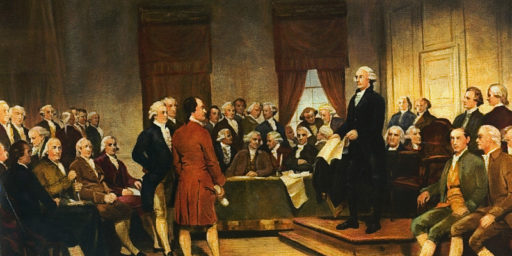NATION BUILDING 101
Francis Fukuyama has a piece with that title in the current Atlantic Monthly.
The transformation of George W. Bush from a presidential candidate opposed to nation-building into a President committed to writing the history of an entire troubled part of the world is one of the most dramatic illustrations we have of how the September 11 terrorist attacks changed American politics. Under Bush’s presidency the United States has taken responsibility for the stability and political development of two Muslim countries—Afghanistan and Iraq. A lot now rides on our ability not just to win wars but to help create self-sustaining democratic political institutions and robust market-oriented economies, and not only in these two countries but throughout the Middle East.
The fact is that the chief threats to us and to world order come today from weak, collapsed, or failed states. Weak or absent government institutions in developing countries form the thread linking terrorism, refugees, AIDS, and global poverty. Before 9/11 the United States felt it could safely ignore chaos in a far-off place like Afghanistan; but the intersection of religious terrorism and weapons of mass destruction has meant that formerly peripheral areas are now of central concern.
Conservatives never approved of the so-called “humanitarian interventions” undertaken during the 1990s, including those in Somalia, Haiti, Bosnia, Kosovo, and East Timor. Liberals, for their part, remain unconvinced by the Bush Administration’s rationale for its invasion of Iraq. But whether for reasons of human rights or of security, the United States has done a lot of intervening over the past fifteen years, and has taken on roughly one new nation-building commitment every other year since the end of the Cold War. We have been in denial about it, but we are in this business for the long haul. We’d better get used to it, and learn how to do it—because there will almost certainly be a next time.
Critics of nation-building point out that outsiders can never build nations, if that means creating or repairing all the cultural, social, and historical ties that bind people together as a nation. What we are really talking about is state-building—that is, creating or strengthening such government institutions as armies, police forces, judiciaries, central banks, tax-collection agencies, health and education systems, and the like.
This process has two very separate phases, both of them critical. The first involves stabilizing the country, offering humanitarian assistance and disaster relief, rebuilding the infrastructure, and jump-starting the economy. The second phase begins after stability has been achieved, and consists of creating self-sustaining political and economic institutions that will ultimately permit competent democratic governance and economic growth.
The first of these phases is well understood, and although difficult, it lies within the capability of both the United States and the broader international community. (The United States Agency for International Development has a very spotty record in promoting long-term economic growth but is actually pretty good at delivering humanitarian assistance.) The second phase, the transition to self-sustaining development, is far more challenging; and it is even more important in the long run. The key word is “self-sustaining”: unless outside powers are able to leave behind stable, legitimate, relatively uncorrupt indigenous state institutions, they have no hope of a graceful exit.
Fukayama assesses the rebuilding of Iraq as a mixed bag, pointing out both that the administration is unfairly criticized for things out of its control but also several areas where they failed to take advantage of our own institutional experience with state building over the past decade-plus. His chief recommendation for the future is to establish a permanent–civilian–office to oversee and manage these missions:
First, the United States needs to create a central authority, backed by a permanent staff, to manage ongoing and future nation-building activities. One possibility, recommended by the Commission on Post-conflict Reconstruction of the Center for Strategic and International Studies, is to appoint a director of reconstruction. The director could be located in any of a number of places in the government, though the White House would be the most logical, given the delicate interagency relationships involved. (Recognizing that it had been a mistake to grant the Pentagon primacy over the reconstruction of Iraq, the White House staff moved to take back that authority in October of 2003.) The director’s office would serve as a fund of institutional memory, so that we would not have to perpetually run around teaching ourselves what we already knew.
Second, this coordinating office must be endowed with sufficient authority to bring the government’s warring agencies under control when a crisis emerges. That means a civilian equivalent of the CENTCOM commander should be appointed to take charge of postwar civil planning, coincident with and on a par with military planning.
Third, any standing organization devoted to nation-building should maintain ties with similar agencies in other countries. Although the international community has—through efforts in Somalia, Bosnia, and East Timor—gotten better at nation-building, it, too, lacks the means for preserving institutional memory, and could use American help.
Finally, the reconstruction effort must remain under clear civilian control as it moves from the first stage, stabilizing the region, to the second stage, creating self-sustaining institutions that will ultimately allow the United States a graceful exit. Decisions about how rapidly to turn over authority to local actors, what the sequence for political reform should be, and when and how to reduce aid levels and presence in a country cannot be left to the Department of Defense, which will always be biased in favor of a quick exit.
This suggestion seems reasonable, although bureaucratic czars have a long history of failure. It’s unclear how an administrative overseer could be given the equivalent power of the CENTCOM commander, since the latter has enormous budgetary power. It seems unlikely that a “Reconstruction Commissioner,” who by definition would take over operations on an ad hoc basis, could be given that degree of influence.





I was shocked to read that Warren Zimmerman died in the past week. He has an very good obit in the Post. Warren Zimmerman is noteworthy becuase he was the last Ambassador to Yugoslavia.
Frances’ article was quite good. He book ‘End of History’ remains one of the core handful of books that attempted to re-define what was happening in the world after the collapse of Russia. He was blindsighted by the impact that failed states have had in the world: our decade long struggle with Islamic terror is one aspect of that. Still, the problem with nation building is that there has been very little historical success in that endeavor. Most of the successes occured in the 19th century where colonial governers had free reign without the contraints of the media. The idea of the United Nations doing nation building is almost ludicous: the results of Bosnia have been negative in all the nation building aspects. The only success has been in stopping fighting: civil society in the Balkans is still in tatters with no prospect of ever being repaired.
One of the most interesting books I read is called Adventure Capitalist. The author (moderatly left wing) constantly complains about the parastic nature of the United Nation do-gooders and the NGOs who swarm around them.